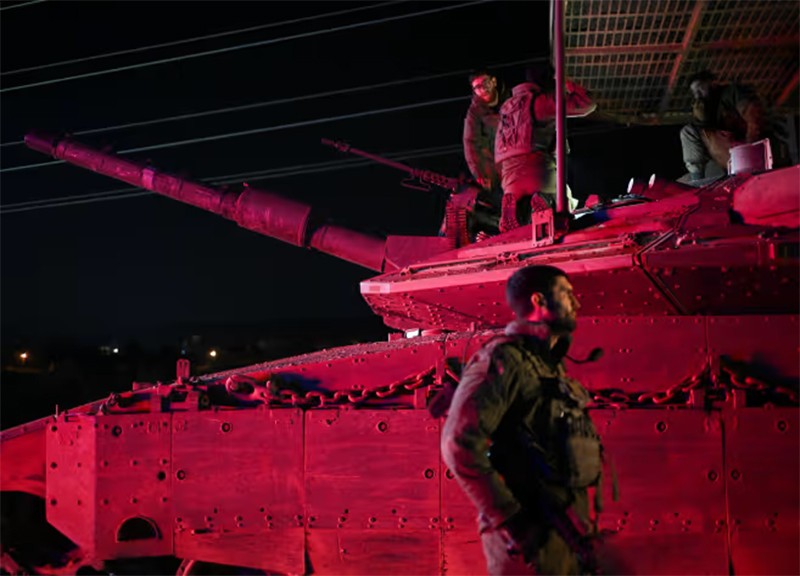
Both sides accuse each other of violations, as time nears for Israeli troops to withdraw from Lebanon
By Anat Peled. WSJ.
An Israel-Lebanon cease-fire that calmed months of cross-border bloodshed is being strained as the two sides accuse each other of violations and the U.S. races to make sure the deal holds.
Israel still has troops on the ground in Lebanon and has continued to regularly strike Hezbollah infrastructure and weapons depots. In a complaint to the United Nations Security Council, Lebanon accused Israel of some 800 land and air attacks since the truce took effect on Nov. 27.
Israel repeatedly has accused Hezbollah, a U.S.-designated terrorist group that controls much of southern Lebanon, of maintaining fighters and weapons including rockets in the south that threaten its security, also in violation of the truce.
The trouble comes ahead of a Jan. 26 deadline for Israeli forces to leave, following their incursions into southern Lebanon across nearly the entire swath of the border. Under the terms of the truce, the U.S.backed Lebanese military is to move in as Israel leaves and work with U.N. peacekeepers to keep the area clear of the Hezbollah militia. But Israel is worried the undermanned, outgunned Lebanese military isn’t up to the task of eventually preventing Hezbollah from rebuilding near the border. Defense Minister Israel Katz said over the weekend that if Lebanon’s army doesn’t enforce the pact, Israel would step up military action. “If this condition isn’t met, there won’t be a deal,” he said.
A collapse of the deal would risk reigniting the fighting that has depopulated a stretch of northern Israel and, according to Lebanon’s health authorities, left thousands of Lebanese dead. It also could undermine a policy achievement for Biden administration officials who have worked all year to prevent the war that began in the Gaza Strip from spreading across the region.
U.S. officials arrived in Beirut on Monday to discuss progress on the deal, and said Israeli troops would pull out of the country in phases moving from west to east. They said Israel began to withdraw from the Mediterranean seaside town of Naqoura on Monday and would continue to turn over territory to the Lebanese army. Israel also withdrew from cities and towns, though its forces remain in many other areas.
U.S. officials said the Lebanese army is up to the job of securing the south. The U.S. and France plan to support the Lebanese army with training and funds.
“Implementing the cease-fire agreement in southern Lebanon is not smooth, but it is successful,” U.S. Special Envoy Amos Hochstein said after co-chairing ameetingoftheinternational committee overseeing the truce.
The Biden administration assesses that Israeli forces are on track to leave southern Lebanon by the Jan. 26 deadline. More than a third of the Israeli forces in Lebanon have left, a person familiar with the matter said.
Lebanese Prime Minister Najib Mikati, speaking after a cabinet meeting, said the country is committed to carrying out its responsibilities under the truce and accused Israel of inventing situations that threaten it.
The Israel-Lebanon truce aimed to end fighting that began shortly after the Hamasled attacks on southern Israel that left some 1,200 dead on Oct. 7, 2023. Hezbollah began firing rockets at Israel to support Gaza, setting off a backand-forth exchange for months.
Hezbollah stood down after it was battered by intense bombing, ground maneuvers and intelligence operations launched by Israel this fall. It has made veiled warnings that it could again take military action if Israel doesn’t meet the deadline for withdrawing.
“Our patience may run out before 60 days or persist longer,” Hezbollah chief Naim Qassem said in a Jan. 4 speech.
Some Israeli analysts say the deal was flawed from the start—difficult to enforce, with too tight a time frame and a reliance on the Lebanese army, which failed to enforce the terms of a truce that ended hostilities between Israel and Hezbollah in 2006.
But the pact has stopped the heavy fighting, and some analysts say both sides have little interest in escalating.
Hezbollah mostly has withdrawn its heavy infrastructure from southern Lebanon, if not many of its personnel, and is severely depleted. Israel killed much of its senior leadership, and has weakened its main sponsor, Iran.














